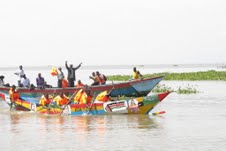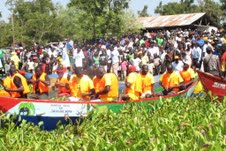Writes Leo Odera Omolo In Kisumu City
The position of East African region as the continent’s most attractive tourist destination has come under serious threats from other regional blocs taking advantage of the region’s lengthy business procedures, insecurity and poor infrastructure to boost their competitiveness edge.
The latest publication of the World Economic Forum {WEF] survey on global tourism and travel competitiveness is jointly written by experts and just released.
It shows that Kenya, Uganda, Rwanda, Tanzania and Burundi are badly trailing emerging global tourism giants in sub-Saharan Africa as Seychelles, Mauritius, and South Africa.
In the sub-Saharan region, the three countries were ranked at the top followed by Cape Verde, Namibia, Gambia, and Botswana.
Kenya, the EAC’s top tourism investment destination come eighth. The WEF cited the insufficient property rights, protection, insecurity, lengthy and costly business procedures as well as dilapidated infrastructure as the main drawbacks.
In the sub-Saharan Africa ranking Rwanda, Tanzania and Uganda took position nine 112 and 13 respectively while Burundi was ranked at 30.
At the global level, only Kenya made it to the top 100 countries of the 140 surveyed, coming in at position 96, Rwanda was ranked 105, Tanzania 109, Ugfanda 116, Burinbdi was two positions shy at the last position.
The EAC has been pushing to increase its share of the growing global tourism market. Last month, the EAC secretariat in Arusha reported that it had lined up several projects to increase tourism earnings from USD 7 billion to USD 16 billion annually by the year 2020 .
The planned investment is expected to cost the USD 3.95 billion by the year 2020 up from the current USD 1.65 billion.
The coordinator of the East Africa’s Tourism Platform, Wateri Matu was recently quoted as saying tha6 whereas the traditional tourism products based on the region’s natural resources will continue playing a crucial role in the industry, there is the need for innovations and creativity.
The region’s problems, he added, is the over reliance on traditional source markets. Europe and the US with little emphasis on Africa and in particular the EAC,” Matu said.
The WEF ranking came at a time when East Africa’s tourism sector is preparing for a bumpy ride in 2013, caused by a show down over fears of insecurity and Euro zone crisis.
In Kenya, the managing director of the Kenya Tourists Board Murithi Ndegwa was last week quoted widely by the local media as having said that the country’s recently investment in transport infrastructure such as the up-grading of the Kisumu Airport and the on-gong expansion of the Jomo Kenyatta International Airport could boost the county’s competitiveness.
In what may be affecting the market is the Euro zone crisis because the most of the country’s visitors come from Europe. The other effect is the issue f the travel adversaries, adding that that now that the general elections in Kenya are over Kenya are over, the Tourist Board hopes the travel adversaries would be lifted.
The Kenya Tourist Board, Ndegwa disclosed, has been meeting with its counterparts in the EAC to plan joint marketing initiative and strategies. The project line up included the introduction of a single tourists’ visa classification of hotels, increased marketing expenditure and training of industry players in the hospitality industry.
“We also need to harmonize immigration management system and introduce some sophisticated equipment in collaboration with the relevant authorities in the five member countries, mainly for security reasons.
Ends


